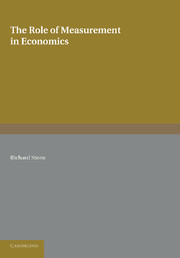II - Economics and Measurement
from INTRODUCTION
Published online by Cambridge University Press: 05 June 2016
Summary
As I am going to talk about the part played by measurement in economics I propose at this point to say a little about these terms. The essentially economic aspect of a problem has been defined by Professor Robbins in saying that ‘economics is the science which studies human behaviour as a relationship between ends and scarce means which have alternative uses’. This way of putting the matter brings out the important point that, while many situations iṅ actual life have an economic aspect, few if any can be analysed wholly in economic terms. Taken literally, however, it would bring the applied economist practically to a full stop since he cannot in general estimate the importance of economic factors unless he is prepared to make assumptions about, and if necessary arrange to hold roughly constant, certain non-economic factors such as changes in tastes. In fact he can frequently do this for himself in a rough-and-ready way although undoubtedly it would be again if he could fall back on other branches of the social sciences for help in such matters. The moral of Robbins's definition is that in applied work much more integration of the social sciences is needed.
Measurement is concerned with finding an expression for the degree of difference in distinguishable qualities or characteristics. It is possible if a means can be found for bringing the amount of any characteristic under investigation into a certain relationship with a set of numbers. Thus we may bring the weight of pig-iron produced at different blast furnaces into relation with a set of numbers and express the different outputs as so many tons in each case. But evidently there is no need for the set of numbers to be unique; for in the above instance, by a mere change of unit, we should obtain a new set of numbers, e.g. if we expressed the result in pounds or in kilograms. But all these different sets of numbers can be obtained from one another by multiplication by a constant; for example if y is the weight expressed in pounds and x is the weight expressed in tons then y = 2240x and so on. Different measures obtained from one another by multiplication by a constant are related by a straight line relationship which passes through the zero-point on the scale of each measure simultaneously.
- Type
- Chapter
- Information
- The Role of Measurement in Economics , pp. 5 - 7Publisher: Cambridge University PressPrint publication year: 2013



